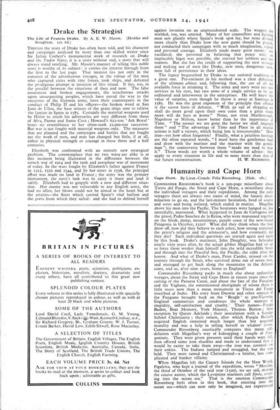Drake the Strategist
THOUGH the story of Drake has often been told, and his character and campaigns analysed by more than one skilled writer since Sir Julian Corbett's monumental work of research on Drake and the Tudor Navy, it is a story without end, a story that will always stand retelling. Mr. Mason's manner of telling this noble story is worthy of its subject: it carries the interest through from the first to the last page. That interest lies not only in the romance of the adventurous voyages, in the valour of the men who captured cities with tiny forces, took ships, and defeated the prodigious attempt at invasion of this island. It lies, too, in the parallel between the situations of then and now. The false assurances and broken engagements, the treacherous attacks upon unsuspecting peoples, which have paved the way to the successes of the German army, have their counterparts in the conduct of Philip II and his officers—the broken word at San Juan de Ulloa, the base seizure of the grain ships sent to relieve the famine in Spain in 1585. Certainly the material weapons used by Hitler to crush his adversaries are very different from those of Alva, Parma and Santa Cruz ; Howard's 622-ton Ark Royal' bears no resemblance to 'her often-sunk 22,000-ton successor. But war is not fought with material weapons only. The measures that are planned and the campaigns and battles that are fought are the work of men, and man has changed but little, if at all, either in physical strength or courage in these three and a half centuries.
Elizabeth was confronted with an entirely new strategical problem. The commonplace that no two wary are alike is at this moment being illustrated in the difference between the trench war of 1914 and the tank and aeroplane war of movement of today. In the wars fought by Elizabeth's father against France in 1512, 1522 and i544, and by her sister in 1556, the principal effort was made on land in France ; the army was the primary instrument, the navy's task was to carry it there and land it safely. Elizabeth had to grapple with a new and different situa- tion. Her enemy was not vulnerable to any English army, she had no allies, her blows could not be aimed at the heart but at the arteries—the fleets which carried Spain's vital bullion and the ports from which they sailed : and she had to defend herself against invasion on an unprecedented scale. The weapon she wielded, too, was untried. Many of her counsellors and fighting men saw plainly where Spain's weak spot lay, but none divined more clearly than Drake how the new game should be Played, nor conducted their campaigns with so much imagination, vigour and personal courage. Elizabeth made many great errors : she vacillated, she persisted in believing that peace with an implacable bigot was possible, she starved her soldiers and her seamen. But she has the credit of supporting the new strategy and making use of men like Drake, new men, dangerous men, men full of persistence in their ideas.
The legacy bequeathed by Drake to our national traditions is a great one. Pre-eminent in his method was a clear definition of the ultimate .object and, following that, the use of all the available force in attaining it. The army and navy were not two services in his eyes, but two arms of a single service to be co- ordinated and interwoven in the enterprises. He well knew the value of surprise, even though he threw it away at Santiago in 1585. He was the great exponent of the principle that offence is the surest form of defence. " With 5o sail of shipping we shall do more good upon their own coast than a great many more will do here at home." None, not even Marlborough, Napoleon or Nelson, knew better than he the importance of Time. " The sooner we are gone the better we shall impeach them " and " The advantage of Time and Place in all martial actions is half a victory, which being lost is irrecoverable." How true—yet how often forgotten! Finally, what a priceless heritage are the often repeated words, " I must have the gentleman haul and draw with the mariner and the mariner with the gentle- man "; the controversy between them " made me mad to hear it." Those words are worth a whole volume of advice: they apply to every situation in life and to none more than that of


























 Previous page
Previous page